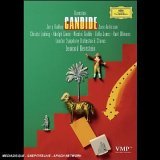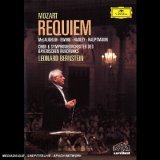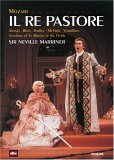 Bernstein, Leonard - Candide (Bernstein, Lso, Hadley, Gedda) | DVD | (11/09/2006)
from £N/A
| Saving you £N/A (N/A%)
| RRP
Bernstein, Leonard - Candide (Bernstein, Lso, Hadley, Gedda) | DVD | (11/09/2006)
from £N/A
| Saving you £N/A (N/A%)
| RRP The historic concert that preceded Bernstein's only recording of Candide. Videotaped at the Barbican Centre, London, 13 December 1989.
![Handel: Messiah - The 250th Anniversary Performance [1992]](/pictures/1008645.jpg) Handel: Messiah - The 250th Anniversary Performance | DVD | (13/10/2003)
from £10.74
| Saving you £3.25 (30.26%)
| RRP
Handel: Messiah - The 250th Anniversary Performance | DVD | (13/10/2003)
from £10.74
| Saving you £3.25 (30.26%)
| RRP This 1992 performance of Handel's masterpiece was filmed at The Point Theatre Dublin. Conducted by Sir Neville Marriner.
 Mozart - Requiem | DVD | (13/11/2006)
from £21.49
| Saving you £-4.50 (N/A%)
| RRP
Mozart - Requiem | DVD | (13/11/2006)
from £21.49
| Saving you £-4.50 (N/A%)
| RRP  Stravinsky: The Rake's Progress | DVD | (20/11/2001)
from £23.95
| Saving you £1.04 (4.34%)
| RRP
Stravinsky: The Rake's Progress | DVD | (20/11/2001)
from £23.95
| Saving you £1.04 (4.34%)
| RRP When this Salzburg Festival production of Stravinsky's The Rake's Progress hit the stage in 1996, the reviews in the British press were red hot. Unfortunately Peter Mussbach's staging, though it has moments of theatrical flair, doesn't translate smoothly to the small screen in this live recording: his grand visual metaphors--an aeroplane that never takes off and stage-hands in anti-Enlightenment monkey costumes--look somewhat pinched. But Sylvain Cambreling's pacy conducting and the central performances come across with 1,000-watt energy. Dawn Upshaw is outstanding as Anne Trulove, bringing as much careful detail to her acting as she does brilliance to her vocal technique; and her performance of the Act I aria and cabaletta, "No word from Tom ... I go, I go to him", must rank among the best ever recorded. Jerry Hadley, dressed as a mullet-haired "yoof" in heavy-metal T-shirt and jeans, doesn't quite have the clarity and vocal agility of, say, Philip Langridge as Tom Rakewell, but the amusing yobbishness of his acting suits his louder redder-blooded performance beautifully. Rich-voiced Jane Henschel is hilarious as Baba the Turk, and uses her large frame with dainty, tippy-toe comic effect. On the DVD: the production is judiciously directed by Brian Large: there are plenty of carefully placed reaction shots, unobtrusive camera movements and there's an overall sense of a highly charged live performance. The recording levels, though generally excellent, occasionally offer a muffled phrase or two. There are subtitles in English, German, French and Spanish but no other special features. --Warwick Thompson
![Weill: Aufsteig und Fall der Stadt Mahagonny [1998]](/pictures/1028714.jpg) Weill: Aufsteig und Fall der Stadt Mahagonny | DVD | (30/01/2001)
from £33.73
| Saving you £-8.74 (N/A%)
| RRP
Weill: Aufsteig und Fall der Stadt Mahagonny | DVD | (30/01/2001)
from £33.73
| Saving you £-8.74 (N/A%)
| RRP Kurt Weill's complex score reigns supreme in Peter Zadek's 1998 Salzburg Festival staging of The Rise and Fall of the City of Mahagonny, the collaboration with Brecht which became a target for Nazi insurrection on its 1930 premiere. The city itself is suggested by the attitudes and personalities of the singers rather than by Richard Peduzzi's Spartan sets. It's bleak stuff in many ways, not least in its vision of the human state: squaring up to corruption is a lonely and fatal business. But thanks to Weill's musical eclecticism, which ranges from barbershop to lieder, there are moments of intense beauty, not least in the duets between lumberjack Jimmy Mahoney and prostitute Jenny. There are, too, flashes which anticipate Weill's American future on Broadway. The lilting "Alabama Song", that gift to every would-be cabaret artist in search of a Lotte Lenya moment, works wonderfully as an ensemble piece. Despite occasional inaudibility, the singing is often breathtaking. Gwyneth Jones is a majestic Begbick, Catherine Maltifano's voluptuous and earthy Jenny also has a rarely seen sweetness and Jerry Hadley's Jimmy Mahoney is ultimately almost unbearably moving. Food for thought, indeed. On the DVD: The Rise and Fall of the City of Mahagonny is presented in 16:9 picture format, but would have benefited from the scale of a widescreen treatment. It can be difficult to keep track of everything that's going on. The cavernous stage is probably responsible for the acoustics which sometimes allow the orchestra to overwhelm the singing, otherwise well served by the PCM stereo sound. There are no DVD extras but the excellent booklet and production notes are welcome.--Piers Ford
 Mozart - Il Re Pastore (Marriner, Asmif) | DVD | (13/03/2006)
from £N/A
| Saving you £N/A (N/A%)
| RRP
Mozart - Il Re Pastore (Marriner, Asmif) | DVD | (13/03/2006)
from £N/A
| Saving you £N/A (N/A%)
| RRP Set in Classical antiquity Mozart's Il re pastore tells of the thwarted love of Aminta (the innocent 'shepherd king' of the title) for the well-born Elisa and that of the nobleman Agenore for the deposed tyrant's daughter Tamiri. No less a figure than Alexander the Great resolves these conflicts of private passion and public status. First performed in Salzburg in 1775 Sir Neville Marriner conducts a top international cast including Sylvia McNair Jerry Hadley and Iris Vermillion in this 1989 staging from Salzburg's Landestheater.
![Missa Solemnis - Beethoven [2005]](/pictures/1045532.jpg) Missa Solemnis - Beethoven | DVD | (24/11/2005)
from £15.25
| Saving you £4.74 (31.08%)
| RRP
Missa Solemnis - Beethoven | DVD | (24/11/2005)
from £15.25
| Saving you £4.74 (31.08%)
| RRP With his Missa solemnis the composer broke with all conventions for the composition of a mass creating a work that went beyond the normal framework of the liturgy. His treatment and interpretation of the text creates the impression of a coherent set of events and as such the work distances itself from the normal liturgical procedures becoming instead the main focus of interest.In his introduction to the performance given in the Cologne Cathedral as part of the World Youth Day 2005 Pope Benedict XVI states: The Missa solemnis bears overwhelming witness to an unceasing search for belief that refuses to turn its back on God.
 Johann Strauss - Die Fledermaus / Marc Minkowski, Salzburg Festival 2001 | DVD | (04/03/2003)
from £20.00
| Saving you £4.99 (24.95%)
| RRP
Johann Strauss - Die Fledermaus / Marc Minkowski, Salzburg Festival 2001 | DVD | (04/03/2003)
from £20.00
| Saving you £4.99 (24.95%)
| RRP Hans Neuenfels' unconventional production of Johann Strauss' opera with new dialogue: Marc Minkowski is the musical director.
 Highlights From Glyndebourne - Various Artists | DVD | (30/10/2006)
from £20.00
| Saving you £-7.01 (N/A%)
| RRP
Highlights From Glyndebourne - Various Artists | DVD | (30/10/2006)
from £20.00
| Saving you £-7.01 (N/A%)
| RRP Featuring extracts from Carmen Idomeneo La Cenerentola Orfeo ed Euridice Il Barbiere di Siviglia and L'Incoronazione di Poppea.

Please wait. Loading...
This site uses cookies.
More details in our privacy policy